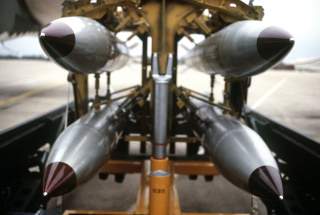Nuclear Weapons: The Most Overrated Weapon of War?
And 4 other super weapons that are simply overhyped--and why.
The Predator is a fine little airplane, but it has its issues for sure. It flies slow, doesn’t carry much ordnance, and can’t maneuver worth a damn. A Predator once tried to ambush an Iraqi MiG-25 in air-to-air combat, but failed utterly. Simply put, the Predator cannot operate in a contested environment. This means that it cannot significantly contribute to combat over a wide range of potential conflict zones, including Ukraine, Syria, and any serious conflict in the East or South China Seas.
The effectiveness of the Predator is an artifact of the peculiar political conditions of the War on Terror, where states (like Pakistan) want US airstrikes against insurgents, but also want to deny that they want such strikes. The weaknesses of the Predator, ironically, serve to embarrass some American allies. The Pakistani military cannot plausibly claim that Predators flying over Pakistani airspace do so without its permission.
But these facts have barely dented the popular perception of the Predator. In addition to its role as a reconnaissance and strike aircraft, the Predator serves as a sponge for vitriol that would be better directed at the policies of the U.S., Yemeni, and Pakistani governments.
The Predator is the Etrich Taube of the drone set; the first mass production drone with a sufficiently flexible architecture to undertake a wide variety of missions. It’s an important aircraft, but hardly one that deserve the attention it has received.
Conclusion:
To reiterate, using the concept “overrated” requires evaluating the difference between reality and hype. The family can include useless weapons that have a veneer of utility, or good weapons that have acquired legendary status. Most of the weapons described above are useful, within careful limits. Some aren’t. In all cases, however, our national security conversation would be better served by appreciating the limits, as well as the promise.
Robert Farley is a senior lecturer at the Patterson School of Diplomacy and International Commerce. His work includes military doctrine, national security, and maritime affairs. He blogs at Lawyers, Guns and Money and Information Dissemination and The Diplomat. Follow him on Twitter:@drfarls.
This first appeared in July 2014 and is being reposted due to reader interest.

